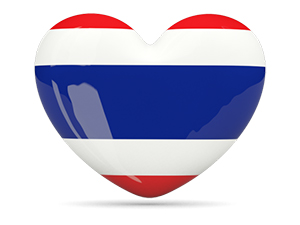If you've ever been to Thailand, or have any Thai friends, you'll know what an unbreakable sense of national pride Thais have. This is reflected by a number of traditions, none more important than showing ones respect to the nation and King through the singing of the national Anthems.
That's right, there are two…
At eight in the morning and six in the evening, citizens across Thailand stand and show honour to their national anthem. Played everywhere from schools to offices, factories and government buildings, the Thai people have enshrined this custom in law. Unlike most countries, who make do with one anthem, Thailand has two.
Though the nation had a few national anthems during the latter years of the 19th Century, it was not until 1913 that Sansoen Phra Barami was formally adopted. Early in his reign, King Chulalongkorn (Rama V, 1868-1910), made a trip to Singapore, whereupon he was announced by a guard of honour and a military band playing God Save the Queen.

Following on to Jakarta (Batavia as it was known then under Dutch control) the King was greeted by an early 19th Century tune by the name of In Praise of His Majesty. The King found that the theme was somewhat lacking in the pomp and circumstance he had heard in the British anthem, and set to work to replace it.
The bandmaster of the Siam Royal Guards was instructed to compose a western influenced song that would match up in majesty to God Save the Queen. The result was Sansoen Phra Barami, which has remained in use with few changes until the present day.
Lyrics were composed by the King’s half-brother, Prince Naris, which were modified slightly by King Rama VI (1910-1925) prior to the formal adoption of Sansoen Phra Barami as the national anthem of Siam in 1913.
The period during which this tune was played ubiquitously lasted just nineteen years, until the bloodless revolution of 1932. The transition from absolute monarchical system to a constitutional monarchy spurred the need for an anthem to represent the new Siam.
Having been the royal music advisor to the Thai court—with composing the music for the Thai National Anthem–Phra Chenduriyang was commissioned to drum a new anthem.
Being the son of a German-American musician who had had a hand in an arrangement of Sansoen Phra Barami, it may have been thought by the commissioning officials that the musical talent ran deep in the Chenduriyang family. Unfortunately for Phra Chenduriyang, the process was not a simple one. For three days, he managed to come up with nothing and slept little. On the fourth day, on the route into his office, he remembered the No1 Symphony by Brahms and became inspired.
In his office, Chenduriyang in a fit of creativity dashed out what would become the Thai national anthem in fifteen minutes, and raced to the relevant officials to present his piece. Despite the haste in which Chenduiyang felt he had to write the piece, the anthem, with lyrics written by Khun Wichit Matra, was not officially adopted by Siam until 1934, following a committee meeting. By this point, the anthem had been sung and played throughout the country.
At this time, it was also agreed that Sansoen Phra Barami would become the anthem of the Royal Family, making Siam (and subsequently Thailand) one of the few nations on Earth to bear two official national anthems. Sansoen Phra Barami was used to herald the king, bid him farewell or otherwise pay tribute to him. In practical terms, Sansoen Phra Barami is used when the king arrives or departs from official events, and also at large sports or entertainment events. This song is also played before every movie at the cinema, for which you will be prompted to stand.
In 1939, the government decreed that Siam would become Thailand, which necessitated a change to the lyrics of the national anthem to incorporate the new name of the country. A national competition was conducted and new lyrics composed by Colonel Luang Saranuprabhandh in the name of the Royal Thai Army became the winner.
On December, the tenth, 1939, the original tune by Chenduriyang with the new lyrics was officially adopted as the National Anthem of the Kingdom of Thailand and have been in use consistently up to the present day.
In 2006, there were calls from some parts to change both the tune and the lyrics of the national anthem, even going so far as to see alternative music and lyrics presented. The proposal was roundly rejected by the public and was abandoned.
Lyrics to The National Anthem of Thailand (เพลงชาติ)
Please note that there are three translations of this song. However, the version below has become the most widely used and popular among translators.
ประเทศไ ทยรวมเลือดเนื้อชาติเชื้อไทย
/bprà-tâde tai ruam lûead núea châad chúea tai/
Thailand unites the flesh and blood of all the Thais,
เป็นประชารัฐ ไผทของไทยทุกส่วน
/bpen bprà-chaa-rát, pà-tai kăwng tai túk sùan/
The land of Thailand belongs to all the Thais,
อยู่ดำรงคงไว้ได้ทั้งมวล
/yùu dam-rong kong wái dâai táng muan,
Their sovereignty has always long endured,
ด้วยไทยล้วนหมายรักสามัคคี
/dûai tai lúan măai rák săa-mák-kii/
For the Thais seek love and also unity,
ไทยนี้รักสงบ แต่ถึงรบไม่ขลาด
/tai níi rák sà-ngòp, dtàe tŭeng róp mâi klàat/
Thais love peace, but if we have to fight the war, we don’t fear.
เอกราชจะไม่ให้ใครข่มขี่
/àke-kà-ráat jà mâi-hâi krai kòm-kìi/
We don’t let anyone take away our freedom
สละเลือดทุกหยาดเป็นชาติพลี
/sà-là lûeat túk yàat bpen châat plii/
The Thais give up every drop of blood,
เถลิงประเทศชาติไทยทวี มีชัย ชโย
/tà-lĕrng bprà-tâde châad tai tá-wii mii chai chá-yoo/
Long last the nation’s pride and victory, HOORAY!.
Lyrics to Sansoen Phra Barami (Royal Anthem) (สรรเสริญพระบารมี)
We, Your Majesty's loyal subjects,
Pay homage with deep heartfelt veneration,
To the Supreme Protector of the Realm,
The mightiest of monarchs complete with transcendent virtues,
Under whose benevolent rule, we Your subjects,
Receive protection and happiness,
Prosperity and peace;
Moreover, we wish that whatsoever Your Majesty may desire,
The same may be fulfilled.
PLEASE NOTE: Any comments considered offensive to the nation or Royal Family will be deleted during moderation. This is a very sensitive subject matter, and so I ask you to remain respectful to Thailand and its people.
Last Updated on



Leave a Reply